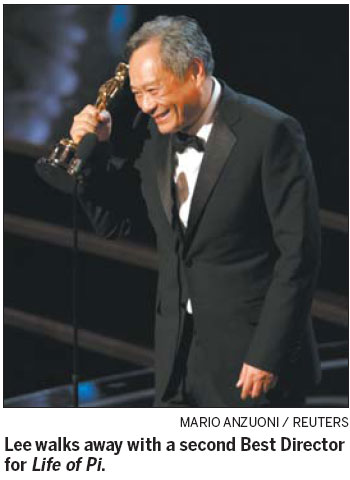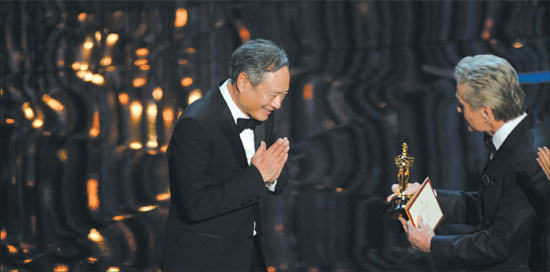It's a fine Life
Updated: 2013-02-26 07:57
By Liu Wei (China Daily)
|
||||||||

|
Ang Lee accepts the Oscar for Best Director from actor Michael Douglas at the 85th Annual Academy Awards. Robyn Beck / AFP Photo |
Ang Lee's epic Life of Pi was the biggest winner at the 85th Academy Awards, garnering four awards including Best Director. Liu Wei reports.
Ang Lee's 3-D adaptation of Yann Martel's bestselling novel tells a spiritual fable about a boy's adventures on the ocean with a Bengal tiger as his only companion. This will be his third Oscar, after an Academy Award for Best Foreign Language Film with Crouching Tiger, Hidden Dragon in 2000 and Best Director for Brokeback Mountain in 2005.
Few Chinese directors have achieved what Lee, 59, has in terms of both popular and critical acclaim.
In the 1990s, Zhang Yimou and Chen Kaige made their names at European film festivals, but they later switched to commercial blockbusters after 2000, and have not produced impressive works as far as artistic achievements are concerned.
Lee's success can be attributed to both his own hard work and the Hollywood film industry, according to Ben Ji, a veteran producer.
"What Lee has been doing, and what most mainland directors have failed to do, is to always embrace new challenges, instead of staying within one's comfort zone," Ji says.
"While many Chinese filmmakers tend to work on a proven formula, Lee explores new genres and subjects all the time, many of which are very challenging, such as sexual liberation in The Ice Storm and homosexuality in Brokeback Mountain."
On the other hand, the sophisticated film industry in Hollywood has made it possible for such an innovative and ambitious filmmaker to exploit his talents.
He takes Life of Pi as an example.
"The film deals with the most difficult elements in filmmaking: Water, animals and children. In China, where box office receipts are now the biggest concern in making a film, few investors would have dared take the adventure with Lee."
Lee's success is phenomenal, but hard to replicate, says scriptwriter Shi Hang.
"Lee's deep understanding of both East and West has contributed much to his success," he says. Lee's ability to understand can be traced to his solid comprehension of both Chinese culture and Western theater.
Lee, born into a scholarly family in Taiwan, received a traditional Chinese education before he went to the United States to study at the University of Illinois, where he completed his bachelor's degree in theater in 1980. He later studied at the Tisch School of the Arts of New York University.
His first three feature films were Taiwan stories, financially subsidized by Taiwan's film funds for young directors with potential. He did not stop there, but boldly went on to film Sense and Sensibility, an English book-to-screen classic starring celebrated English actress Emma Thompson.
"Sense and Sensibility and his next two films, The Ice Storm and Ride with the Devil, dealt with subtle subjects even Western filmmakers would be cautious about, such as the American Civil War. But Lee always managed to find a delicate approach," Shi says.
What will inspire Chinese directors about Lee's triumphs is to open their minds to learn, says the producer Ji, who is optimistic that more directors like Ang Lee will soon appear among China's young brood of filmmakers.
"Let's hope what they learn from both Eastern and Western cultures will bring about some fresh air in the industry here. Maybe they will be less obsessed with box office takings and will be better prepared to learn through education and experience," he says.
Contact the writer at liuw@chinadaily.com.cn.
Online
See more at http://www.chinadaily.com.cn/entertainment/oscar2013/

(China Daily 02/26/2013 page18)

 In Photos: 7.0-magnitude quake hits Sichuan
In Photos: 7.0-magnitude quake hits Sichuan
 Li Na on Time cover, makes influential 100 list
Li Na on Time cover, makes influential 100 list
 FBI releases photos of 2 Boston bombings suspects
FBI releases photos of 2 Boston bombings suspects
 World's wackiest hairstyles
World's wackiest hairstyles
 Sandstorms strike Northwest China
Sandstorms strike Northwest China
 Never-seen photos of Madonna on display
Never-seen photos of Madonna on display
 H7N9 outbreak linked to waterfowl migration
H7N9 outbreak linked to waterfowl migration
 Dozens feared dead in Texas plant blast
Dozens feared dead in Texas plant blast
Most Viewed
Editor's Picks

|

|

|

|

|

|
Today's Top News
Live report: 7.0-magnitude quake hits Sichuan, heavy casualties feared
Boston suspect cornered on boat
Cross-talk artist helps to spread the word
'Green' awareness levels drop in Beijing
Palace Museum spruces up
First couple on Time's list of most influential
H7N9 flu transmission studied
Trading channels 'need to broaden'
US Weekly

|

|








